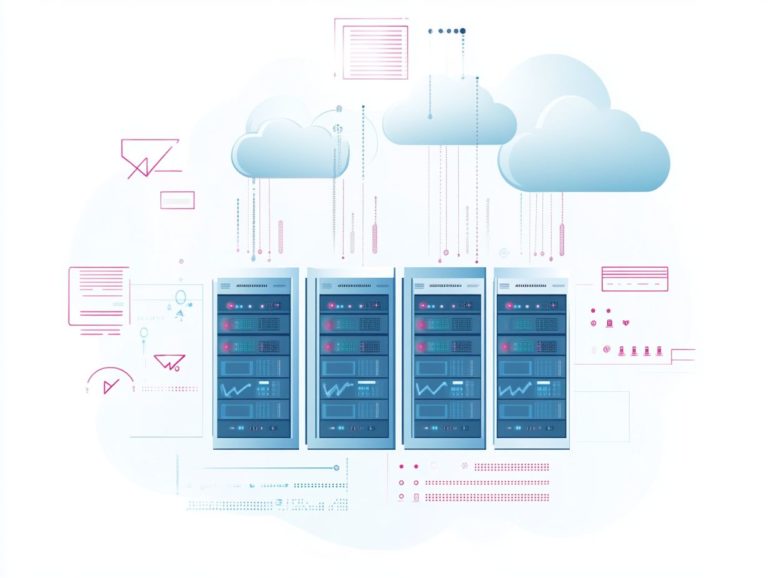How IaaS Supports Business Continuity
In today s fast-paced business landscape, ensuring continuity during disruptions has never been more critical. Understanding business continuity is essential; it lays the groundwork for effective strategies.
Infrastructure as a Service (IaaS), which stands for Infrastructure as a Service, is a valuable tool that provides scalable solutions to keep your operations running seamlessly.
This article delves into the definition and significance of business continuity, the essential role of IaaS, its myriad benefits, and real-life case studies that demonstrate its effectiveness. You will also explore future trends shaping the dynamic relationship between IaaS and business continuity.
Don’t miss out; dive in to discover how IaaS can secure your business s future today!
Contents
- Key Takeaways:
- Understanding Business Continuity
- The Role of IaaS in Business Continuity
- Benefits of IaaS for Business Continuity
- Implementing IaaS for Business Continuity
- Case Studies: How Companies Have Used IaaS for Business Continuity
- Future of IaaS and Business Continuity
- Frequently Asked Questions
- How does IaaS support business continuity?
- What are the main benefits of using IaaS for business continuity?
- How does IaaS ensure data availability during a disaster?
- Can IaaS help with disaster recovery for my business?
- How does IaaS support remote work for business continuity?
- What security measures should I consider when using IaaS for business continuity?
Key Takeaways:

IaaS is crucial for maintaining business continuity by providing reliable infrastructure and resources that can support operations during disruptions. For businesses looking to enhance their resilience, understanding how to create an IaaS disaster recovery plan offers cost-effectiveness and scalability, reducing downtime and increasing flexibility during times of crisis.
When implementing IaaS for business continuity, it’s important to consider best practices and learn from successful case studies to ensure smooth operations in the future.
Understanding Business Continuity
Business continuity involves proactive strategies and meticulous planning to ensure essential operations persist during and after any disruptive event.
This concept is vital for maintaining operational resilience across various sectors, including financial institutions, healthcare, and e-commerce, where safeguarding critical workloads against potential threats is paramount.
A solid business continuity plan includes recovery strategies, data resilience tactics, and compliance with regulatory standards, all designed to ensure robust systems are in place.
This approach minimizes downtime and protects customer satisfaction, allowing your business to thrive even in challenging circumstances.
Definition and Importance
The definition of business continuity revolves around the strategies and processes implemented to maintain essential functions during and after a disaster. This concept establishes the foundation for your organization s ability to respond effectively to operational interruptions, whether from natural disasters, cyber threats, or other unexpected events.
By embracing proactive strategies, you can pinpoint potential risks and craft contingencies that guarantee uninterrupted service delivery. Implementing comprehensive risk management techniques protects critical operations and bolsters overall resilience.
Training your staff and regularly testing your plans are crucial steps to ensure everyone is prepared. This fosters a culture of readiness, empowering your teams to act swiftly and decisively when challenges arise.
The Role of IaaS in Business Continuity
Infrastructure as a Service (IaaS) serves a crucial function in ensuring business continuity by delivering scalable resources that enhance operational stability during disruptions, including disaster recovery solutions.
With a growing dependence on cloud providers, you can harness IaaS solutions to fortify your disaster recovery strategies, ensuring they are both robust and effective. This enables seamless access to the data and applications essential for ongoing operations.
Adopting this dynamic system approach minimizes downtime and facilitates the management of critical workloads vital for maintaining service delivery.
How IaaS Can Help Maintain Operations
IaaS solutions empower you to maintain seamless business operations by delivering robust cloud infrastructure that facilitates application replication and automated backups.
These features protect your essential data and guarantee that your applications remain accessible during unexpected outages or disruptions.
Your company can replicate critical applications across various geographic regions, effectively minimizing risks linked to localized failures.
Automated backup processes meticulously capture data at regular intervals, ensuring recovery is both straightforward and efficient.
This synergy of replication and backup plays a vital role in enhancing operational resilience, allowing you to uphold continuity and respond swiftly to any challenges that come your way.
Benefits of IaaS for Business Continuity

The advantages of Infrastructure as a Service (IaaS) for business continuity are substantial.
It offers cost-effectiveness and significantly reduces downtime, positioning it as an appealing choice for organizations across various sectors.
Cost-Effectiveness and Scalability
IaaS offers a unique cost-effective solution through its pay-as-you-go model, giving power to businesses especially in the financial and healthcare sectors to adjust their resource allocation based on real-time demand.
This level of flexibility ensures you only pay for what you actually use, significantly cutting down on overhead costs.
For example, imagine a financial institution ramping up its computing power during tax season when workloads surge. Then, they can seamlessly scale back afterward to avoid unnecessary expenses.
Similarly, healthcare providers might find themselves in need of extra resources during crises, such as a pandemic. IaaS allows them to swiftly enhance their IT capabilities without the hassle of maintaining surplus infrastructure.
By adopting this model, various industries can not only optimize their budgets but also streamline operations and elevate their overall service delivery.
Reduced Downtime and Increased Flexibility
One of the primary advantages of IaaS is its remarkable ability to significantly reduce downtime, enhancing your operational continuity.
With strong cloud solutions easily accessible to you, you can swiftly transition to resilient and scalable virtual environments.
For instance, consider a well-known e-commerce platform that adopted IaaS to manage peak traffic seasons. This move helps minimize service interruptions and leads to a significant improvement in their load times.
Additionally, a financial services firm utilized IaaS to ensure backup systems that ensure your service continues even if something goes wrong. This enables rapid recovery from potential outages.
These case studies show how your organization can thrive with IaaS, ultimately resulting in improved customer satisfaction and trust.
Implementing IaaS for Business Continuity
Implementing IaaS for business continuity demands careful planning and following best practices in managing infrastructure.
It is crucial to approach this process with a strategic mindset, ensuring that every aspect aligns seamlessly with your organizational objectives.
Key Considerations and Best Practices
Keep key considerations in mind when implementing IaaS, particularly operational stability and robust security protocols.
Start by thoroughly assessing your existing infrastructure to pinpoint any potential vulnerabilities.
It is crucial to put comprehensive security measures in place, such as encryption and access controls, to protect sensitive data within the cloud environment.
Regular monitoring and audits can significantly bolster your security posture and ensure compliance with industry regulations.
By understanding the scalability options available, you can quickly adapt to changing demands and maintain operational stability even as usage fluctuates.
By adhering to these best practices, you’ll create an effective IaaS framework that skillfully balances performance with security.
Case Studies: How Companies Have Used IaaS for Business Continuity

Many companies have skillfully harnessed IaaS to enhance their business continuity strategies, showcasing its effectiveness through a range of compelling case studies and success stories.
Don’t miss out on the advantages IaaS can offer your business!
Real-Life Examples and Success Stories
Companies using IaaS show clear benefits, such as better service delivery and strong disaster recovery solutions.
For example, a leading e-commerce platform scaled its operations effortlessly during peak seasons with IaaS. This reduced downtime, keeping their services available during unexpected technical issues.
A healthcare provider also chose IaaS for its effective disaster recovery options. These features allowed quick backups and data retrieval, which are crucial for patient care.
These real-world cases highlight how organizations enhance efficiency and strengthen operations against disruptions, ultimately improving customer satisfaction.
Future of IaaS and Business Continuity
The future of IaaS in business continuity is poised for remarkable growth, with insights on how IaaS supports hybrid cloud environments driving emerging trends and innovative solutions that significantly enhance operational resilience.
Expect a transformative evolution in how businesses leverage IaaS to ensure seamless continuity and robust performance in the face of challenges.
Predictions and Emerging Trends
Predictions for the future of IaaS suggest a surge in automation, enhanced business resilience, and broader adoption of cloud solutions across diverse sectors.
As you navigate the ever-evolving digital landscape, experts anticipate a significant shift towards more automated infrastructure management. This transformation will streamline operations and ease pressure on IT teams.
Such advancements empower organizations to pivot swiftly during disruptions, ensuring strong business continuity strategies.
With a focus on scalable solutions, you will increasingly leverage cloud technologies to foster greater flexibility and adaptability, positioning yourself to better withstand challenges and seize new opportunities as they arise.
Frequently Asked Questions
How does IaaS support business continuity?

IaaS (Infrastructure as a Service) provides businesses with online computing services, including servers, storage, and networking capabilities that can be accessed remotely. This allows businesses to quickly and easily continue their operations, even in the event of a disaster or disruption.
What are the main benefits of using IaaS for business continuity?
IaaS offers numerous benefits for business continuity, including increased flexibility, scalability, and cost savings. With IaaS, businesses can quickly adjust their computing resources as needed without investing in physical infrastructure.
How does IaaS ensure data availability during a disaster?
IaaS providers typically operate multiple data centers in different geographic regions, ensuring that data remains accessible even during a localized disaster. This redundancy helps ensure continuous data availability for businesses using IaaS.
Can IaaS help with disaster recovery for my business?
Yes, IaaS can play a critical role in disaster recovery for businesses. With virtualized infrastructure, businesses can swiftly replicate their systems and data in the cloud, allowing for faster recovery times and minimizing potential downtime or loss of productivity.
How does IaaS support remote work for business continuity?
With IaaS, businesses can access their vital services instantly from anywhere with an internet connection. Employees can work from anywhere, ensuring that business never skips a beat!
What security measures should I consider when using IaaS for business continuity?
When using IaaS for business continuity, consider security measures such as data encryption, access controls, and disaster recovery planning. Choose a reputable and reliable IaaS provider with strong security protocols in place.






